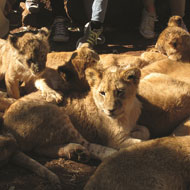
Lion bone trade an emerging threat to wild populations
The South African government has nearly doubled its controversial quota for the export of skeletons from captive bred lions.
Conservationists expressed dismay as it was revealed that the annual quota was increased from 800 in 2017 to 1,500 this year.
The Born Free Foundation called the decision a ‘cynical’ move designed to placate commercial lion breeders. It comes just days before Cites is due to discuss a major report on the impacts of the lion bone trade.
Cites banned the international trade in bones, bone pieces, bone products, claws, skeletons, skulls and teeth during its 2016 meeting in Johannesburg. South Africa, however, was allowed to continue exporting lion products from its captive-bred lions, if an annual export quota was established.
The country currently has at least 260 intensive breeding facilities, housing around 7,000 lions that are exploited throughout each stage of their lives, the charity added.
Unwitting volunteers pay to hand-rear ‘orphaned’ or ‘rejected’ cubs that have been removed from their mothers at just a few days old, while tourists cuddle cubs and walk with adolescent lions. Adults often become breeding machines or are shot by trophy hunters who pay to take part in canned hunts.
Tiger bones and body parts are turned into glue, cake or wine, to be sold in markets in Vietnam, Laos and China.
As few as 20,000 wild lions remain in Africa and scientists predict further declines without concerted action. The international trade in lion bones has been recognised as an emerging threat to wild lions.
Born Free president Will Travers said: “South Africa’s decision to almost double its quota for the export of skeletons from captive-bred lions flies in the face of both common-sense, the clear need to protect wild lions, and the precautionary principle.
“The cruel, profit-driven, intensive lion breeding industry has been encouraged to grow almost exponentially by the South African authorities over recent years, to the point where the government doesn’t even know how many facilities there are or how many lions they house.
“This industry is out of control, condemns the thousands of animals concerned to a miserable life, and may threaten the future of wild lions across their range.”
Image © Born Free



 The Veterinary Medicines Directorate (VMD) is inviting applications from veterinary students to attend a one-week extramural studies (EMS) placement in July 2026.
The Veterinary Medicines Directorate (VMD) is inviting applications from veterinary students to attend a one-week extramural studies (EMS) placement in July 2026.